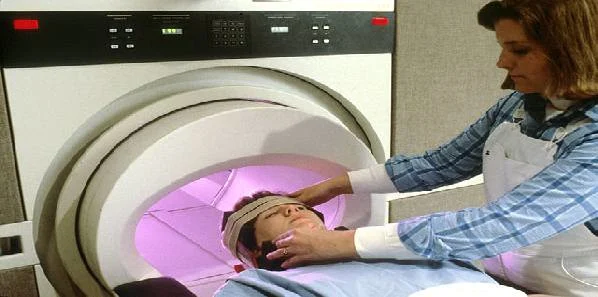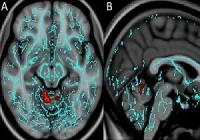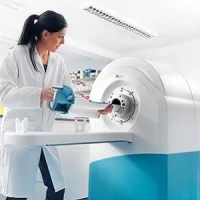Researchers in the UK claim that an instructional DVD designed to help patients prepare for a magnetic resonance imaging (MRI) scan, including pointers on how to relax, led to more successful scan outcomes. The patients receiving the DVD also felt less anxious during the MRI scan, the researchers point out. The findings are published in the British Journal of Health Psychology.
"A successful MRI scan requires the patient to stay completely still as movement can reduce the quality of the image taken and potentially affect diagnostic accuracy," says lead author Dr. Rachael Powell from the School of Psychological Sciences & Manchester Centre for Health Psychology, University of Manchester. "However, staying still in the scanner can be difficult for some people, and some patients do not manage to remain in the scanner long enough to complete the examination."
Previous research indicated self-efficacy to predict successful scan outcome, and interviews with patients identified a need for procedural and sensory information to facilitate successful scan behaviour. For the current study, a DVD intervention was developed which targeted self-efficacy and included two sections with the following contents:
In the study, 83 outpatients who were due to have an MRI scan were divided into two groups. Both groups received the standard MRI Centre information leaflet which included safety information, information related to the appointment, technical features of an MRI scanner, data protection and the experience that might be expected. Only one of these groups received the study DVD; the recipients were asked to watch the DVD at least once before their scan appointment.
Of the 41 patients who received the DVD, 35 had satisfactory scan outcomes, according to the research team. In contrast, in the other group with 42 patients, only 23 had satisfactory scans. A "satisfactory" scan was one where patients successfully stayed in the scanner for the full examination and had high-quality images (i.e., patient movement had not reduced image quality).
"We found that the vast majority of participants found the DVD an easy format to use, with almost all participants viewing the DVD at least once, with over half the participants using it at least twice. Most of the participants found the DVD useful and said it helped them to feel less anxious and more confident about taking the scan," Dr. Powell explains.
"Given the high number of scans where either patients move in the scanner, reducing image quality, or where patients do not manage to stay in the scanner long enough to complete the examination, the finding that an affordable, acceptable and effective intervention can be sent to patients by post prior to their scan could have an important impact on patient care and healthcare costs," she adds.
Source: British Psychological Society
Image Credit: Wikimedia Commons
"A successful MRI scan requires the patient to stay completely still as movement can reduce the quality of the image taken and potentially affect diagnostic accuracy," says lead author Dr. Rachael Powell from the School of Psychological Sciences & Manchester Centre for Health Psychology, University of Manchester. "However, staying still in the scanner can be difficult for some people, and some patients do not manage to remain in the scanner long enough to complete the examination."
Previous research indicated self-efficacy to predict successful scan outcome, and interviews with patients identified a need for procedural and sensory information to facilitate successful scan behaviour. For the current study, a DVD intervention was developed which targeted self-efficacy and included two sections with the following contents:
- The first section, "Preparation for MRI", includes information about the procedures to expect, information about what the scan experience would feel like, a demonstration of a patient undergoing a scan, and information about others' experiences of having an MRI scan.
- The second section details relaxation techniques and encourages patients to practice the techniques before and during their scan.
In the study, 83 outpatients who were due to have an MRI scan were divided into two groups. Both groups received the standard MRI Centre information leaflet which included safety information, information related to the appointment, technical features of an MRI scanner, data protection and the experience that might be expected. Only one of these groups received the study DVD; the recipients were asked to watch the DVD at least once before their scan appointment.
Of the 41 patients who received the DVD, 35 had satisfactory scan outcomes, according to the research team. In contrast, in the other group with 42 patients, only 23 had satisfactory scans. A "satisfactory" scan was one where patients successfully stayed in the scanner for the full examination and had high-quality images (i.e., patient movement had not reduced image quality).
"We found that the vast majority of participants found the DVD an easy format to use, with almost all participants viewing the DVD at least once, with over half the participants using it at least twice. Most of the participants found the DVD useful and said it helped them to feel less anxious and more confident about taking the scan," Dr. Powell explains.
"Given the high number of scans where either patients move in the scanner, reducing image quality, or where patients do not manage to stay in the scanner long enough to complete the examination, the finding that an affordable, acceptable and effective intervention can be sent to patients by post prior to their scan could have an important impact on patient care and healthcare costs," she adds.
Source: British Psychological Society
Image Credit: Wikimedia Commons
References:
Powell R, Ahmad M, Gilbert FJ, et al. (2015) Improving magnetic resonance imaging (MRI) examinations: Development and evaluation of an intervention to reduce movement in scanners and facilitate scan completion. British Journal of Health Psychology, 2 Feb 2015 DOI:
10.1111/bjhp.12132
Latest Articles
Scanners, MRI scans, anxiety, DVD, relaxation techniques
Researchers in the UK claim that an instructional DVD designed to help patients prepare for a magnetic resonance imaging (MRI) scan, including pointers on...










